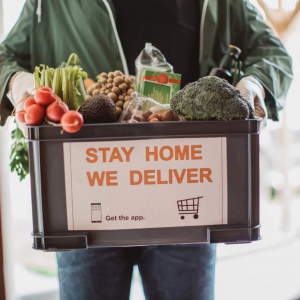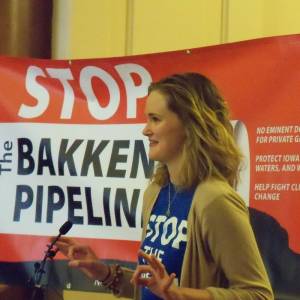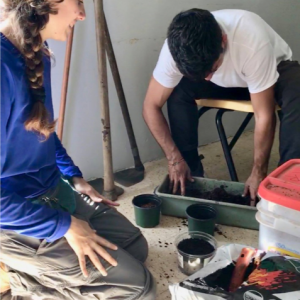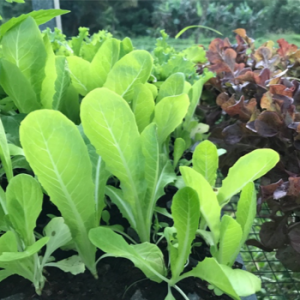A Garden Fable
 “Thanksgiving Schmanksgiving! There’s nothing to be thankful about when it comes to food,” complains Stanley the Stinkbug. “It’s either a factory-farmed turkey or an organic turkey I can’t afford? What a choice!
“Thanksgiving Schmanksgiving! There’s nothing to be thankful about when it comes to food,” complains Stanley the Stinkbug. “It’s either a factory-farmed turkey or an organic turkey I can’t afford? What a choice!
Sometimes the situation can seem dismal with hunger on the rise, food deserts, pesticide corporations buying up seed companies, and diet-related disease,” drones Stanley. “The smelly list goes on and on, and people don’t give a hoot! Just a bunch of couch potatoes watching sports all day.”
 “Stanley, you may be watching too much network news,” replies Chris Carrot. “People all over the country and planet are working together to build food economies that are fair and more sustainable — while supporting nearby farmers! These stories just don’t make the big headlines.”
“Stanley, you may be watching too much network news,” replies Chris Carrot. “People all over the country and planet are working together to build food economies that are fair and more sustainable — while supporting nearby farmers! These stories just don’t make the big headlines.”
Chris continues, “Neighborhood leaders and groups are bringing fresh, local food to their communities, Stanley. These are initiatives to be thankful about! One Great Hour of Sharing gifts help fund a program in Oregon to train immigrant families in farming skills at Huerto de la Familia. In Louisville, one initiative has turned teens into ambassadors of fresh produce and another holds food justice classes and brings in local produce for Fresh Stop markets in their lower-income neighborhoods.”
“New initiatives are dealing with all the food waste in our system. Students are demanding better and fairer food in their cafeterias. And watch the video of the first nonprofit supermarket just opened in Pennsylvania. It’s an oasis in a food desert,” added Chris.

“Yeah, yeah, a few random examples.” growls Stanley. “What about the advertising that food corporations bombard us with everyday? Have you seen Anna Lappé’s brand-new Food Mythbuster video, “The Myth of Choice: How Junk-Food Marketers Target Our Kids“? It’s terrifying. All you’ve described doesn’t amount to an ant hill.”
 “No, Stanley, it’s happening everywhere,” exclaims Chris! “Presbyterian camps and conference centers around the country are smelling the roses of food justice! Ghost Ranch has revived its farm, Stony Point is producing veggies all over their campus and is putting in a greenhouse as we speak. Joseph Badger Meadows Camp and Eastminster Presbytery in Ohio is establishing a working farm and training program, right on their land!” gushes the Carrot. “And how does a cattail stir-fry sound? A new movement among Native Americans is bringing back traditional foods and changing lives!” continues Chris.
“No, Stanley, it’s happening everywhere,” exclaims Chris! “Presbyterian camps and conference centers around the country are smelling the roses of food justice! Ghost Ranch has revived its farm, Stony Point is producing veggies all over their campus and is putting in a greenhouse as we speak. Joseph Badger Meadows Camp and Eastminster Presbytery in Ohio is establishing a working farm and training program, right on their land!” gushes the Carrot. “And how does a cattail stir-fry sound? A new movement among Native Americans is bringing back traditional foods and changing lives!” continues Chris.

“Okay. Not bad, but what about global hunger? Those giant free trade agreements will make it even tougher for family-scale farmers?”

“Yes, we need to advocate to halt Fast Track and call for transparency and fairness in the Trans-Pacific Partnership to protect farmers overseas,” say Chris “Luckily, policy makers are beginning to admit that export-oriented cash crop farming is not the answer to ending poverty. In fact, research shows that it is small farms that are the key to creating global food security!
Presbyterians can support great agricultural development by giving to the Presbyterian Hunger Fund and by funding great projects through the Food Resources Bank in Malawi and the Democratic Republic of Congo. And we have La Via Campesina and food sovereignty movements around the world — such as the Alliance for Food Sovereignty in Africa and the US Food Sovereignty Alliance — to thank for building strong coalitions to resist injustice and build just and sustainable food economies everywhere!”

“Very impressive!” admits Stanley. “And as for the turkey, my farmer neighbor is actually giving me a free-range turkey in exchange for my promise to stay out of her vegetables. Come on over at 3:00.”
Read more »
 Will we have enough to eat?! Great attention is being paid to our food and farm system given the fault lines laid bare by the Covid-19 pandemic. We are learning how much there is that needs changing! I have selected articles in the nine topics listed below and hope these are helpful as we envision… Read more »
Will we have enough to eat?! Great attention is being paid to our food and farm system given the fault lines laid bare by the Covid-19 pandemic. We are learning how much there is that needs changing! I have selected articles in the nine topics listed below and hope these are helpful as we envision… Read more »
 Will we have enough to eat?! Great attention is being paid to our food and farm system given the fault lines laid bare by the Covid-19 pandemic. We are learning how much there is that needs changing! I have selected articles in the nine topics listed below and hope these are helpful as we envision… Read more »
Will we have enough to eat?! Great attention is being paid to our food and farm system given the fault lines laid bare by the Covid-19 pandemic. We are learning how much there is that needs changing! I have selected articles in the nine topics listed below and hope these are helpful as we envision… Read more »
 By Ahna Kruzic, Communications Director of Pesticides Action Network North America Original post Globally, today’s food and agriculture systems are responsible for more climate change-contributing emissions than the world’s cars, trucks, planes, and trains combined. At the same time, we’re confronted with evidence that climate change is wreaking havoc on agricultural production—and unraveling systems of…
By Ahna Kruzic, Communications Director of Pesticides Action Network North America Original post Globally, today’s food and agriculture systems are responsible for more climate change-contributing emissions than the world’s cars, trucks, planes, and trains combined. At the same time, we’re confronted with evidence that climate change is wreaking havoc on agricultural production—and unraveling systems of…  This is the second part of a two-part series on Puerto Rico, Climate Change and Food. Part one can be found here. “Back to the Land” and Agroecology Jesús Vázquez Negron and I visited Ian Pagán Roig at Finca (farm) Josco Bravo in Toa Alta, Puerto Rico, which is one of the three sites at…
This is the second part of a two-part series on Puerto Rico, Climate Change and Food. Part one can be found here. “Back to the Land” and Agroecology Jesús Vázquez Negron and I visited Ian Pagán Roig at Finca (farm) Josco Bravo in Toa Alta, Puerto Rico, which is one of the three sites at…  Overview In December, I participated in a delegation comprised of staff from Presbyterian Disaster Assistance (PDA), Presbyterian Self-Development of People (SDOP), and Special Offerings, and we invited local pastors and mid-council staff to join us for the visits to Fideicomiso de la Tierra, a decimated family farm in Lares, and Presbyterian Camp Guacio over the course of…
Overview In December, I participated in a delegation comprised of staff from Presbyterian Disaster Assistance (PDA), Presbyterian Self-Development of People (SDOP), and Special Offerings, and we invited local pastors and mid-council staff to join us for the visits to Fideicomiso de la Tierra, a decimated family farm in Lares, and Presbyterian Camp Guacio over the course of… 

 “Thanksgiving Schmanksgiving! There’s nothing to be thankful about when it comes to food,” complains Stanley the Stinkbug. “It’s either a factory-farmed turkey or an organic turkey I can’t afford? What a choice!
“Thanksgiving Schmanksgiving! There’s nothing to be thankful about when it comes to food,” complains Stanley the Stinkbug. “It’s either a factory-farmed turkey or an organic turkey I can’t afford? What a choice!